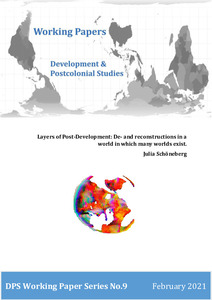| dc.date.accessioned | 2023-11-28T16:05:48Z | |
| dc.date.available | 2023-11-28T16:05:48Z | |
| dc.date.issued | 2021-02 | |
| dc.identifier | doi:10.17170/kobra-202311249082 | |
| dc.identifier.uri | http://hdl.handle.net/123456789/15229 | |
| dc.language.iso | eng | |
| dc.rights | Namensnennung - Weitergabe unter gleichen Bedingungen 4.0 International | * |
| dc.rights.uri | http://creativecommons.org/licenses/by-sa/4.0/ | * |
| dc.subject | post-development | eng |
| dc.subject | pluriverse | eng |
| dc.subject | alternatives to development | eng |
| dc.subject | transitions | eng |
| dc.subject.ddc | 300 | |
| dc.title | Layers of Post-Development: De- and reconstructions in a world in which many worlds exist | eng |
| dc.type | Working paper | |
| dcterms.abstract | Post-Development as a critique of ‘development’ is almost as fuzzy and amoeba-shaped as the concept, discourse and practice it has long proclaimed as failed (Ziai 2015). While alternatives to ‘development’ have been called for, it remains unclear as to ‘alternatives to what?’ and ‘what kind of alternatives’ are in demand and by whom. The approach of this paper is to understand Post- Development as a set of theories, strategies and visions that all depart from a similar critique of ‘development’ as imperial and hegemonic construct based on a firm logic of coloniality, but that can take different shapes and be practiced on different layers according to various epistemological and ontological underpinnings. The analysis explores Buen Vivir, Ubuntu, Minobimaatisiiwin, Swaraj and Degrowth as practices of ‘alternatives to development’. The discussion concludes by tentatively formulating preliminary characteristics that could frame visions of alternatives to ‘development’, allowing to situate alternative concepts, their means and ends on different levels and layers by specifically determining their core: whether they are concerned with improving ‘development’ interactions, with ‘development’ policy and economic strategies, with changes of the economic system or with philosophical foundations and relations to the non-human environment. The paper seeks to contribute to systematizing and categorizing Post-Development writings, laying a basis for further theorization of transitional discourses and practices more generally. | eng |
| dcterms.accessRights | open access | |
| dcterms.creator | Schöneberg, Julia | |
| dcterms.extent | 71 Seiten | |
| dc.contributor.corporatename | Kassel, Universität Kassel, Fachbereich Gesellschaftswissenschaften | ger |
| dc.subject.swd | Buen Vivir | ger |
| dc.subject.swd | Post-Development | eng |
| dc.subject.swd | Wandel | ger |
| dc.type.version | publishedVersion | |
| dcterms.source.series | DPS Working Paper Series | eng |
| dcterms.source.volume | No. 9/2021 | |
| kup.iskup | false | |


